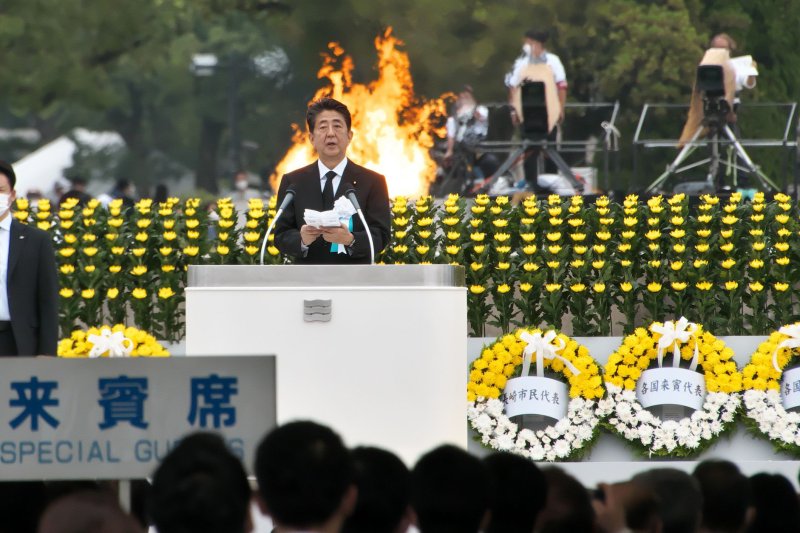1 of 5 | Japanese Prime Minister Shinzo Abe speaks during a ceremony marking the 75th anniversary of the atomic bombing of Hiroshima, Japan, at the Hiroshima Peace Memorial Park on August 6, 2020. File Photo by Keizo Mori/UPI |
License Photo
July 8 (UPI) -- Former Japanese Prime Minister Shinzo Abe died in a hospital on Friday just hours after he was shot while giving a campaign speech in the western city of Nara. He was 67.
The longest-serving prime minister in Japan's history, Abe was one of the country's most influential -- and controversial -- politicians. He was perhaps best known for his "Abenomics" reforms that were meant to shake Japan out of its decades-long stagnation, as well as his quest to revise Japan's pacifist constitution in an effort to strengthen its military.
The Tokyo native served as prime minister from 2006 to 2007 and again from 2012 until 2020, when he resigned due to the relapse of a bowel disease that ended his first term -- remarkable staying power in an office that has often been a revolving door of relatively faceless politicians.
"My poor health should not lead to wrong political decisions," Abe said at one time. "As I'm no longer able to meet the expectation of the mandate of the people of Japan, I have decided that I should not stay in the position as prime minister anymore."
When he first took office at age 52, Abe was Japan's youngest prime minister since World War II. He quit after one year filled with political scandals and a humiliating electoral defeat for his ruling Liberal Democratic Party.
After winning a second tenure in a remarkable political comeback, his Abenomics growth strategy of government spending, structural reforms and monetary easing delivered early results, boosting Japan out of its long deflationary malaise.
But Japan's growth took a hit during the trade war between China and the United States in 2019 and Abe later came under criticism for his government's handling of the coronavirus pandemic, which battered the economy.
![]()
U.S. President
Donald Trump greets Japanese Prime Minister Shinzo Abe as he arrives at the White House in Washington on February 10, 2017. File Photo by Kevin Dietsch/UPI
A complicated legacy
Abe was born in 1954 into a political dynasty. His grandfather, Nobusuke Kishi, was an accused World War II war criminal who later became prime minister of Japan from 1957 to 1960. Abe's father, Shintaro Abe, was a leading lawmaker in the ruling Liberal Democratic Party and served as foreign minister in the 1980s.
Shinzo Abe entered politics in 1993, winning a seat in parliament after his father's death. He rose to national prominence in the early 2000s by taking a strong stance against North Korea over the contentious issue of Japanese abductees.
While Abe remained hawkish toward Pyongyang, he made efforts to repair fractured relationships with South Korea and China. However, he infuriated both with a 2013 visit to Yasukuni Shrine, which commemorates millions of Japan's war dead -- including numerous figures who were convicted of war crimes.
Abe never returned to Yasukuni as prime minister but visited again after stepping down from office, most recently in April, sparking outrage once more in Seoul and Beijing.
At the same time, Abe cultivated stronger ties with Washington and maintained a personal relationship with President Donald Trump.
Abe spent much of his political career trying to move Japan away from a cycle of recrimination and regret over its actions in World War II and into a more muscular role on the world stage -- a position that won him nationalist fans at home but at times alarmed others, domestically and abroad.
![]()
A television displays a press conference by Japanese Prime Minister Shinzo Abe near the Shinjuku station in Tokyo during the early days of the
COVID-19 pandemic on April 7, 2020. File Photo by Keizo Mori/UPI
Unfinished business
Perhaps Abe's signature policy goal was a long-running quest to revise Japan's pacifist constitution, which was written by the United States after World War II, to allow for a more robust military.
Against a growing nuclear threat from North Korea and an increasingly assertive China, Abe was able to expand Japan's military capacity and pass a law that allows Japan to defend its allies. But public and political opinion remained cool on the constitutional revision and Abe could never muster the necessary support to make the change, especially after his party failed to win a supermajority in parliament in 2019.
Despite falling popularity ratings during his later years in office, Abe had been poised to see through one of the major accomplishments of his tenure -- the 2020 Tokyo Olympic Games, which were ultimately postponed due to the COVID-19 pandemic. He resigned before the Summer Games were held in 2021.
Abe remained a vocal public figure after leaving office, advocating for increased defense spending and greater support of Taiwan against threats from China. He even floated the idea of a nuclear-sharing agreement with the United States during a public television appearance in February.
Abe was also still a power broker within his party and had been busy on the campaign trail stumping for candidates, which has maintained a near-monopoly on political power in Japan since the end of World War II.
Abe is survived by his wife, former disc jockey Akie Matsuzaki, whom he'd been married to since 1987. The couple had no children. His older brother, Nobuo Kishi, is a politician serving as Japan's defense minister.
Shinzo Abe, then-deputy secretary-general of the Liberal Democratic Party, speaks to the media after a four-day trip to India at the LDP head office in Tokyo on March 23, 2005. He emphasized the importance of better relations with India. Photo by Keizo Mori/UPI |
License Photo
abe


















